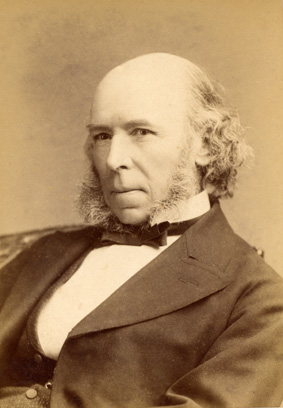
- Image via Wikipedia
How often misused words generate misleading thoughts. – Herbert Spencer
Rhetoric is a discipline modern pedagogy abandoned too rashly, and we’ve been paying the price for years. The ability to influence situations by using rhetorical devices has not decreased, but our training to detect and counter these techniques is sometimes lacking.
A common rhetorical technique these days consists of using a familiar or commonly shared quotation — an intellectual rule of thumb — which seems to summarize a key idea, and through the use of that quote, appropriate some mindshare and maybe even win an argument.
The problem is, some of the most commonly deployed quotes are being misused — that is, they are either themselves mangled versions of their true selves or they don’t withstand even a moment of calm reflection. Yet, in the haste of modern life and the pressure of group-think, they and their users get a free pass.
Recently, David Crotty explored a misquote from Field of Dreams: the oft-quoted, “Build it, and they will come.” Let’s start with this one to show how a quote, not only taken out of context but misquoted during the extraction, has become the equivalent of a warped, even backwards, intellectual shortcut.
Field of Dreams involves a man’s search for reconciliation on multiple levels. The journey involves leaps of faith, summarized by the phrase, “Build it, and he will come.” This phrase, pivotal in the movie to represent the protagonist’s hope to conjure up a bygone era, is essentially a key to unlocking nostalgia.
In the business world, the quote is usually misquoted as, “Build it, and they will come.” From my experience, it’s invoked either to criticize or support a business plan. But the transfer from Field of Dreams (“Build it, and he will come” equating with a faith in nostalgia) to business (“Build it, and they will come” equating with a faith in the future) is striking when you think about it.
I’ve seen this quote most often used to criticize a business idea, as if the risk of building something and seeing if it’s valuable is intolerable. The fact that this quote can ride a wave of derision is worth pondering, because that attitude presupposes that risk in audience development can be effectively mitigated before audience development. In my years of launching things, I think you actually do have to create and offer something to see if an audience will respond. You can mitigate the risk somewhat by using market research beforehand, but all of those steps are far from perfect. The money you spend mitigating the risk can sometimes add to the risk.
Risk is part of business, not the foolishness of soft minds. And risk sometimes pays off big. Ponder this quote, which misappropriates the Field of Dreams quote in the typical way, but sends another message about what can happen when risks pay off:
Google’s “build it and they will come” business model has generated billions of dollars in ad revenue and profit for the search giant.
So, not only is “build it, and they will come” a misquote that turns “he” into “they,” nostalgia into risk, and hope into anxiety, its use can also be a signal that some unrealistic thinking about risk and media investments might be embraced by its user, who may be deriding action because it entails risk. But risk can pay off. Companies like Amazon, eBay, YouTube, and Facebook — entrants the survived much derision when they first emerged — might agree.
Another common misquote is, “Information wants to be free.” Of course, the entire quote is much more nuanced:
On the one hand information wants to be expensive, because it’s so valuable. The right information in the right place just changes your life. On the other hand, information wants to be free, because the cost of getting it out is getting lower and lower all the time. So you have these two fighting against each other.
Stuart Brand’s point in making this statement was to illustrate a tension of the information age, one that he wisely foresaw as defining most future discussions.
By appropriating only the “free” part, advocates of various business models have been able to cloud the essential tension Brand identified and make a large swath of people at least susceptible to the notion that the ultimate commercial resting energy of information is “free.” I think it’s clear that major industries have been changed by the popularization of an incomplete quote not in keeping with the spirit of the original.
And how expensive has this misappropriation been for some?
Robert Frost is another whose lines have been misappropriated selectively to suit various perspectives on how the world should work. Just last month, an open access advocate used the line from Frosts “Mending Wall” that reads, “something there is that doesn’t love a wall,” as the title of a post. It’s a common trope among open access advocates, but their appropriation of the line obscures the fact that the poem, which this line begins, is about how people don’t like a wall that has been broken by frost heaves such that “even two can pass abreast.” In the same poem, Frost also introduces the line, “Good fences make good neighbors.”
Remember, the poem is called, “Mending Wall.” A wall has fallen down, leading to thoughts about the importance of walls and boundaries, and even the social interactions that maintaining walls can foster.
By taking a line out of context and bending it to a purpose almost exactly at odds with its original intent, the rhetorical design of Frost’s poem is blatantly misused.
Rhetoric boils down to using logos, pathos, and ethos effectively. Drawing on quotes is a nifty way of using all three simultaneously — we seem to be using our intellect, we evoke an emotional response, and we do both via a shared memory or touchpoint. But because quotations are such potent rhetorical packages, they should be used accurately and with care.
Discussion
9 Thoughts on "Misused Quotes We Live By: When Rules of Thumb Get Bent or Amputated"
I’m afraid your interpretation of Frost’s “Mending Wall” is not correct. It is true that the speaker (as a farmer) meets his neighbor to re-build the wall, but the speaker questions the logic of the wall, and points out that the wall is totally unnecessary (“we do not need the wall”), and sees the mending process as a stupid, meaningless game. It’s his stubborn neighbor who replies with the cliche that “Good fences make good neighbors”
In the poem Frost writes:
“We wear our fingers rough with handling them.
Oh, just another kind of out-door game,
One on a side. It comes to little more:
There where it is we do not need the wall:
He is all pine and I am apple orchard.
My apple trees will never get across
And eat the cones under his pines, I tell him.
He only says, ‘Good fences make good neighbors’.
Spring is the mischief in me, and I wonder
If I could put a notion in his head:
‘Why do they make good neighbors? Isn’t it
Where there are cows?
But here there are no cows.
Before I built a wall I’d ask to know
What I was walling in or walling out,
And to whom I was like to give offence.”
Frost ends the poem by likening his neighbor to an “old stone savage” and, shows that his neighbor does not have the insight to move beyond a saying that came from his father (and which might have had importance then, but has no importance now), and which his neighbor is so pleased at having remembered it, that he repeats the cliche. Frost writes:
“He will not go behind his father’s saying,
And he likes having thought of it so well
He says again, ‘Good fences make good neighbors.’ “
I don’t agree with your interpretation. In other sections, the protagonist has rebuilt parts of the wall after hunters have passed, and doesn’t think it’s stupid or unnecessary. The part you quote is about when they come to a section where the wall seems unnecessary — where orchards demarcate the lines between the properties. But demarcation is still needed. He compares his neighbor to an “old-stone savage” in appearance only because he’s holding stones in both hands. It’s a poetic way of saying he looked like a caveman at a moment of perception. The protagonist of the poem has rebuilt walls many times, and seems only playful in tweaking his neighbor’s earnest adherence to the game. This playfulness shows itself time and again — when the protagonist refuses to believe it’s frost heaves that knocked down the wall at the beginning, later when he wants to propose it was “elves,” etc. Ultimately, the poem is about capturing two different people in a ritualistic activity, one more modern and one more parochial. It’s certainly not about payment models.
I’m inclined to agree with Kent. There is ambiguity in the poem, but it certainly doesn’t lend itself to a pro-wall reading at all. If anything the poem is really about unthinking adherence to tradition and not “going behind” inherited “wisdom.”
The line in question, “Something there is that doesn’t love a wall” refers specifically to a wall’s artificiality, and how nature will continually damage them necessitating human repair if the wall is to remain in place. Seems to me to be perfectly applicable to a piece on artificially constructed limits on access to information, and how much energy will be increasingly required to “preserve assets” in the face of trends in open access and changing technologies that make sharing information easier than ever (the “something”).
The correct quote from Field of Dreams is: “If you build it, he will come.”
It’s a common trope among open access advocates, but their appropriation of the line
The article you link is the only time I’ve ever seen it used that way. Do you have other examples to support “common trope… their appropriation”?
Why I ask is that although I disagree with your interpretation, I agree that the poem makes a poor metaphor for publishing models and is best avoided in that context.
What is it that doesn’t love a wall? Frost.
![Reblog this post [with Zemanta]](http://img.zemanta.com/reblog_e.png?x-id=fe50186c-4532-4b91-b90a-3e76b16890e6)


